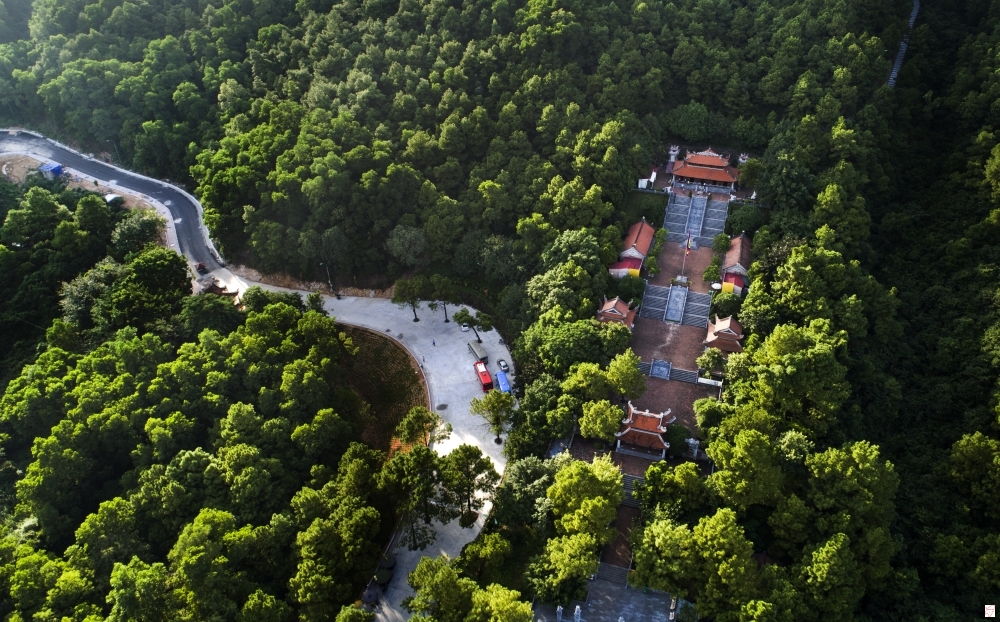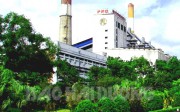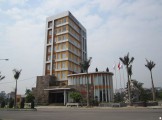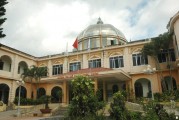Town of Chi Linh pitches its tourism potential

Located in the northeastern part of Hai Duong Province, the mountainous town of Chi Linh is home to many famous historical relic sites, which along with its natural beauty has great potential for tourism development. The town is attracting investment and improving infrastructure to build tourism into a key economic sector.
|
Chi Linh is working hard to improve the quality of its service industries and develop tourism infrastructure. What are your assessments of the town’s efforts?
Chi Linh plays an important role in tourism development in not only Hai Duong but also the northern region. This is stated in various national and regional development strategies. These include the Vietnam tourism development strategy to 2020 with a vision to 2030, master plan for Vietnam tourism development to 2020 with a vision to 2030, master plan for tourism development in the Red River Delta and the coastal northeastern region to 2020 with a vision to 2030, and the revised master plan for Hai Duong Province tourism development to 2020.
Chi Linh has been working with relevant authorities and sectors to develop tourism infrastructure. From 2011-2015, the town focused on transport system planning and improvement and renovation of historical and cultural relic sites. It implemented a VND77 billion project to upgrade and restore the Kiep Bac Temple in 2013, and has so far accomplished the first phase of the project. Chi Linh also implemented a VND715.4 billion project to build a road to the Con Son-Kiep Bac relic site. The project’s first phase is being constructed, with VND160 billion already invested. In addition, entertainment, sports and public projects, including the Mat Son Lake Park, Ben Tam Lake Park, Phuong Hoang Park, Sao Do Square, a children’s culture palace, and a stadium, were built in the town.
From 2016-2020, Chi Linh town will be implementing a project to improve the quality of service industries and develop tourism infrastructure in order to transform its economic structure towards increasing the contribution to the town’s gross domestic product (GDP) of service, trade and tourism sectors. The town seeks to develop tourism into a spearhead economic sector. To that end, Chi Linh will be gradually developing infrastructure in tourist attractions of Con Son - Kiep Bac, Thanh Mai Pagoda, and Cao, Gom, Chu Van An, and Nguyen Thi Due temples, while at the same time upgrading relic sites in the town. Improved infrastructure is expected to help the town attract investors and visitors.
Could you tell us about Chi Linh’s contribution to the Hai Duong Province tourism development?
Chi Linh is an important tourist destination of the province. There are different tours including spiritual tours, eco-tours, and sports, shopping and conference-related tours to the town. The town-based Con Son-Kiep Bac national relic site has attracted about three million visitors per year. Other national relic sites in Chi Linh, including Chu Van An and Nguyen Thi Due temples, and Thanh Mai Pagoda, also attracted millions of visitors annually. Chi Linh ranks second among district-level units in Hai Duong Province in terms of numbers of accommodation facilities (22 of the 150 accommodation establishments in Hai Duong are in Chi Linh), after Hai Duong City. Located between Hanoi and Quang Ninh Province, Chi Linh has a golf course, 14 international and domestic tourist stops, and 51 catering service facilities and restaurants. In 2016, the town earned tourism revenues of VND590 billion, accounting for 40 percent of the province’s total (VND1.489 billion).
|
How will Hai Duong Province assist Chi Linh in tourism development?
The provincial Party Committee, People’s Council and People’s Committee ratified a plan for Hai Duong Province Tourism Development from 2016-2020. This is one of eight important projects to be implemented in accordance with the 16th or 2015-2020 Provincial Party Congress’s resolution. The project will build the Con Son- Kiep Bac area into a national tourist site. Hai Duong is drafting preferential policies for tourism investors in the province, including preferential policies specifically designed for investment in Con Son-Kiep Bac. The province will propose that the government allocate capital and use its capital for tourism infrastructure development, while calling for capable investors in Con Son-Kiep Bac, and considering development of unique tourist offerings, improving tourist workforce and stimulating tourism promotion.
|
Chi Linh is home to more than 273 relic sites, including two special national relic sites and nine national landscape and relic sites. The town is renowned for such historical celebrities as the Great King of Tran Hung Dao, Lord Nguyen Thi Due, teacher and physician Chu Van An, and scholar, politician and master strategist Nguyen Trai. |
© Chí Linh quê tôi tổng hợp và sắp xếp các thông tin tự động bởi chương trình máy tính với sự hỗ trợ của Google Alerts, Skydoor & Baomoi. Tiêu đề và nội dung một số bài viết được Chí Linh quê tôi biên tập cho phù hợp. Link bài viết gốc được đính kèm dạng URL ở phần tác giả cuối mỗi bài viết.
Chí Linh quê tôi do Hội Người Chí Linh tại Đài Loan phát triển và quản lý. Phản hồi, đóng góp thông tin qua email: [email protected]
Những tin mới hơn
Những tin cũ hơn
-
Nhiệt điện Phả Lại báo lãi quý III tăng 18% lên 193 tỷ đồng nhờ tiết giảm chi phí

-
Nhà máy điện "ở trong rừng"

-
Dư nợ Agribank Chi nhánh Hải Dương II đạt gần 5.000 tỷ đồng

-
Constrexim - HOD: Tiên phong xây dựng đô thị Chí Linh

-
BIDV Bắc Hải Dương: Dư nợ cho vay tăng gần 6%

-
Công ty CP Nhiệt điện Phả Lại: Trên 90% lượng tro, xỉ được tiêu thụ

-
Việt Tiên Sơn Địa Ốc chào bán 17,5 triệu cổ phiếu

-
Công ty Cổ phần Trúc Thôn đầu tư dây chuyền sản xuất gạch ốp lát cao cấp





